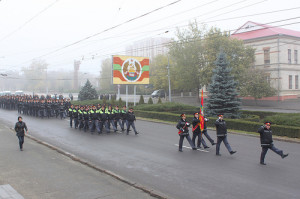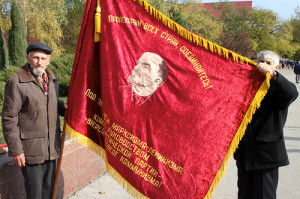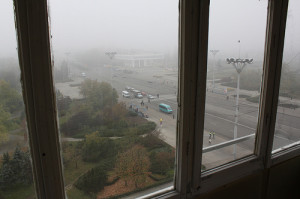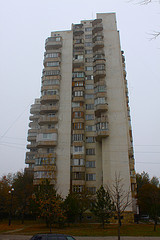The Party Isn’t Over: How the old ways of oppressive Communism are still alive and kicking in the break-away state Transnistria
 At nineteen years old, Roman seems like any other teenager. Sitting in the kitchen as his mother cooks him his lunch, his girlfriend on his arm, he is relaxed and chatting about the new computer he is saving up to buy. But Roman is also a policeman in what is the most severe police-state in Europe. The Pridnesdrovian Moldovan Republic, or Transnistria for short, is a break-away state sandwiched in the borderlands between Moldova and the Ukraine, founded on the principles of Stalin and Lenin. After the break up of the Soviet Union the Russian speaking Transnistrians fought the Moldovan government over independence, and in the eighteen years of uneasy peace since, Transnistria is referred to technically by the West as a post-Soviet frozen conflict zone.
At nineteen years old, Roman seems like any other teenager. Sitting in the kitchen as his mother cooks him his lunch, his girlfriend on his arm, he is relaxed and chatting about the new computer he is saving up to buy. But Roman is also a policeman in what is the most severe police-state in Europe. The Pridnesdrovian Moldovan Republic, or Transnistria for short, is a break-away state sandwiched in the borderlands between Moldova and the Ukraine, founded on the principles of Stalin and Lenin. After the break up of the Soviet Union the Russian speaking Transnistrians fought the Moldovan government over independence, and in the eighteen years of uneasy peace since, Transnistria is referred to technically by the West as a post-Soviet frozen conflict zone.
Roman had invited me back to his parents’ flat to eat a meal of boiled cabbage, sausage and bread. We sat in his small, drab kitchen as he asked me questions about my life as he removed his clip-on tie and hat. I was of interest: no one ever comes to Transnistria, and for good reason. There is little of interest to the tourist and no foreign investment. One might say there is actually nothing here. Tiraspol, the nation’s capital city, is an exercise in architectural bleakness and the handful of shops in the country sell bottles of vodka, cognac and potato crisps. But below a dismal surface, Transnistria is a bizarre country, saturated in suspicion, propaganda and distrust. While most Eastern European nations embraced democracy and lurched into free market enterprise, Transnistria is a Soviet throwback. Igor Smirnov, the country’s leader since conception, is versed in Stalinist, Leninist, and one would think Orwellian, principles. He is an old school despot, running everything from the Presidential Palace situated on the main drag through Tiraspol, with a huge statue of Lenin outside gazing down at the windy boulevard. Although Smirnov keeps a close eye on his citizens, some half a million Transnistrians, the Pridnesdrovian Republic is a haven for organised crime. While those in Tiraspol lucky enough to have a car drive spluttering Ladas, a few brand new American Hummers and Mercedes can be seen cruising the streets. To ask where such flash cars came from in Europe’s most impoverished area would be folly. In reality, these men run the country: trafficking illegal workers and prostitutes, dealing in weapons from ex-Soviet countries and selling drugs.
 Reaching Transnistria is not easy, and it had taken me a full day’s travel on a network of minibuses from Chisinau, the capital of Moldova. Despite no UN country recognising Transnistria as a legitimate nation, there is a border entry procedure to rival even the most officious of countries. With Moldovan and Transnistrian troops eyeballing each other across a line in the road while ‘peacekeeping’ Russian soldiers loiter in armoured personnel carriers, the atmosphere is sufficiently tense. The Russian military presence is to protect the Republic’s sovereignty but is obviously Moscow’s attempt at power play, showing they still have influence in the old Soviet Union. An enormous Soviet hammer and sickle emblem adorned with sheaves of corn emblazons an arch marking the border. This crossing is famed for its corruption: most of Europe’s illegal arms are trafficked through here and it is unthinkable to cross it as a foreigner without a bribe. After answering her questions as best I could in frankly awful Russian and handing over a postcard of Big Ben, the border guard stamped my visa without much further questioning. She waved me past as I discretely scrunched my ten dollar bill that had been ready in the hand back into my pocket. Passing tanks hidden under camouflage scrim and soldiers enjoying a cigarette and laugh, the minibus passed through the war-damaged border town of Bendery and soon entered Tiraspol.
Reaching Transnistria is not easy, and it had taken me a full day’s travel on a network of minibuses from Chisinau, the capital of Moldova. Despite no UN country recognising Transnistria as a legitimate nation, there is a border entry procedure to rival even the most officious of countries. With Moldovan and Transnistrian troops eyeballing each other across a line in the road while ‘peacekeeping’ Russian soldiers loiter in armoured personnel carriers, the atmosphere is sufficiently tense. The Russian military presence is to protect the Republic’s sovereignty but is obviously Moscow’s attempt at power play, showing they still have influence in the old Soviet Union. An enormous Soviet hammer and sickle emblem adorned with sheaves of corn emblazons an arch marking the border. This crossing is famed for its corruption: most of Europe’s illegal arms are trafficked through here and it is unthinkable to cross it as a foreigner without a bribe. After answering her questions as best I could in frankly awful Russian and handing over a postcard of Big Ben, the border guard stamped my visa without much further questioning. She waved me past as I discretely scrunched my ten dollar bill that had been ready in the hand back into my pocket. Passing tanks hidden under camouflage scrim and soldiers enjoying a cigarette and laugh, the minibus passed through the war-damaged border town of Bendery and soon entered Tiraspol.
I had arrived just in time. A police procession was in full swing, high-stepping its way down the main street, with a marching band, Kalashnikovs cleaned and boots polished. Most of the seven or eight people milling around the centre of town ignored it completely.
There are no real hotels to stay in Tiraspol. There is one expensive hotel, a rather optimistic offering to those foreign businessmen who might stay in the capital, but it is known to be crawling with secret policemen. Upon entry to any Transnistrian town, it is required that you register with the local militia. I found a single mother, Lena, who offered to rent her living room to me during my stay. In her mid thirties, she worked as a teacher and her flat was garishly decorated in bright greens and oranges. I turned on the television. Without a satellite dish, which is illegal, the only output available is the state channel. I turned it on. The current offering was a documentary on the history of zips.

View of Tiraspol main street from my room
The view of my room on the eighth floor of a dilapidated block of flats was one of the best in city. I could see the T-34 tank the Russians had abandoned in the main square, alongside the eternal flame to those who gave their lives in the war with Moldova. Although not a country recognised on the world stage, Transnistria produces its own currency, the PMR Rouble. Exchange rates from Euro, Dollars or Pounds seem artificial and the banknotes are small and grimy and often falling apart. No other currency is officially accepted. The same goes with stamps: all post within the Republic must use Transnistrian stamps, but on international envelopes the country’s population begrudgingly use Moldovan ones. The Republic has its own military (bankrolled by Russia), police force, number plates, passport and flag. It is a country in all but name. Across the street from the Palace of the Soviets, an impressive edifice with yet another statue of Lenin, I saw a billboard featuring Smirnov with the Presidents from two other aspiring break away states South Ossetia and Abkhazia. In the land of teetering alliances and failed states, it seems best to stick together.
Near the garrisoned Russian 13th Army there was a small restaurant that sold German food, whose menu offered such dishes as ‘Flesh of Sturgeon with Salad Tenderness of Theresa’. One night, whilst eating there, I asked a waitress what she thought of the Russians, pointing to large billboard across the road where Smirnov was seen shaking hands with Russian Premier Medvedev. “I do not like them, they are aggressive,” she told me sheepishly. She is in a minority in Transnistria, where ethnic Russian speakers pine for a formal union with the Russian Federation. Her restaurant itself was covered in posters of Vladimir Putin and the words “stronger with Russia”.

Into the bizarre mix of what felt like a Communist Disneyland was the Museum of National Heritage. As the lone visitor, I was shown all the exhibits by the curator, turning the lights off after visiting each room. The museum illustrated the history of Transnistria with emphasis on the war with Moldova. I noticed stacks of artillery shells on display in the corner, their firing caps intact and after picking up an ammunition belt noticed that the rounds were still live. Of course, the exhibition culminated with modern Transnistria, complete with plenty of pictures of Smirnov, alongside examples of bank and telephone cards now enjoyed by his citizens. “What will happen when Smirnov dies?” I asked the museum curator. The answer was simple. “Smirnov has a son.”
I had heard that the next day was the anniversary of the Russian Revolution and I asked Lena about it. “Is it Saturday tomorrow? Then, yes, there will probably be something,” she replied, as if Saturday was the day assigned to parading. Standing in front of the Presidential Palace the next day I watched a procession of men march up the main street to Lenin’s statue, their velvet flags adorned with his image. It was the weekend of the twentieth anniversary of the fall of the Berlin Wall, and while the rest of the world celebrated, here in Transnistria old men lay wreathes at Lenin’s feet. I was here where I was arrested by Roman for taking pictures of the Presidential Palace, a crime in Transnistria. But as with many things, the country’s formidable appearance belied a friendly people and the arrest turned into a good humoured chat.
Roman and I finished our meal and walked out into the cold. It was sunny and we sat in the shadow of a large 1950s Soviet warplane and fed the pigeons the stale bread we hadn’t managed to finish during lunch. With little do, the few other residents there had had a similar idea.






